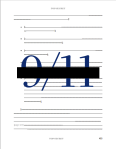As the American public marches into the foothills of the 2016
presidential campaign, Michael Rubin, writing this week in a blog post
at the American Enterprise Institute and a full piece at Commentary, identifies one issue that already merits a pledge from the rapidly expanding field of candidates: the declassification of the 28-page finding on foreign government links to the 9/11 terrorist attacks.
After noting that President Obama’s failure to declassify the 28 pages is squarely at odds with his commitment to run the most transparent administration in American history, Rubin looks ahead to the upcoming battle for the White House:
Indeed, to the extent the campaign overlaps with the last two years of his administration, attention to the topic generated in that forum may be the last nudge Obama needs to provide the American people with a fuller understanding of who enabled 9/11.
After noting that President Obama’s failure to declassify the 28 pages is squarely at odds with his commitment to run the most transparent administration in American history, Rubin looks ahead to the upcoming battle for the White House:
As the election campaign begins and both Republicans and Democrats begin the traditional game of footsie with supporters, donors, and the press, perhaps each and every presidential aspirant should take a pledge: release the missing 28 pages of the 9/11 report on their first day in office. And if they are not willing to take that pledge, perhaps they can explain why deference to Saudi sensitivities continues to trump full transparency if not accountability for the largest and most consequential terrorist attack ever perpetrated on American soil.While still holding out hope that growing public and political pressure will prompt Obama to follow through on the commitment to declassify the 28 pages that 9/11 family members say he personally made to them, 28Pages.org agrees this is an issue worthy of the 2016 national campaign spotlight.
Indeed, to the extent the campaign overlaps with the last two years of his administration, attention to the topic generated in that forum may be the last nudge Obama needs to provide the American people with a fuller understanding of who enabled 9/11.
Amid
growing awareness of the 28 pages among the voting public, candidates
should promptly get on the right side of this issue of transparency
and commit to releasing the 28 pages if elected.
It’s a particularly sensitive topic
for candidates emerging from the current Congress—including Rand Paul,
Elizabeth Warren, Marco Rubio and Ted Cruz—who would be wise to turn a
potential liability on the issue into an asset by taking two steps:
- Reading the 28 pages. Considering congressional peers like Walter Jones, Stephen Lynch and Thomas Massie have described the 28 pages as shocking and history-rearranging—and said that reading the 28 pages is vital to informed and effective counter-terror policy—this should be high on the agenda of every member of Congress, regardless of their ambitions. As we’ve noted before, the level of 28-pages readership on Capitol Hill is scandalously low; it could be just a matter of time until that scandal gets its due media attention and inattentive legislators pay a price at the polls.
- Supporting a resolution urging the president to declassify the 28 pages. In the House, that means signing on to H.Res.14. With the 28 pages movement still seeking a Senate champion, the door is open for a member of that body to demonstrate leadership on an issue that is exceedingly bipartisan in its support.


